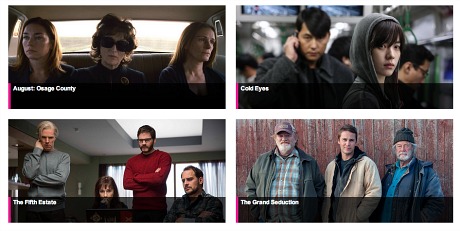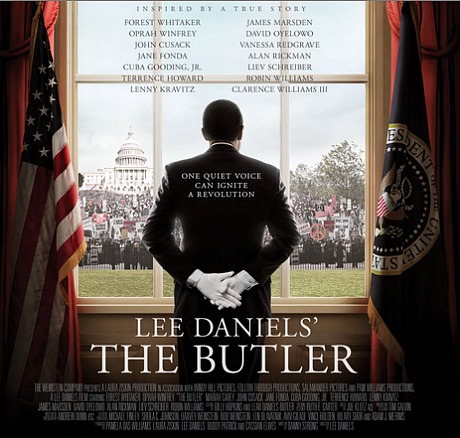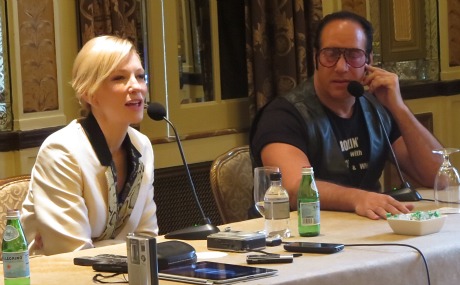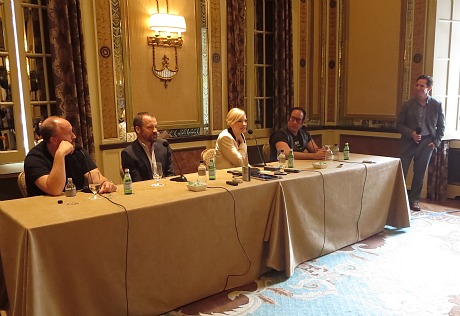I don’t want to know from any film with the word Ronin in the title, much less see it. Friend: “Hey, you wanna catch this Keanu Reeves flick, The 47 Ronin?” Me: “Nope!” Friend: “You don’t think it looks cool?” Me: “All Asian films in which guys in robes wield samurai swords are a complete no-go. Never again will I watch one of these things. I’m done for life.”
Daily
Don’t Over-Trailer Gravity
Don’t go any further exposition-wise than what this trailer contains. Okay, maybe one more trailer after this but that’s all. This is a relatively short “techno-thriller” about survival, remember. In a certain sense it’s a cousin of J.C. Chandor‘s All Is Lost. I would think Warner Bros. marketers would want to hold back as much as they can. I’m presuming I’ll be catching it in L.A. before it premieres at the Venice Film Festival on 8.28.
A Kind of Madness
I am of the minority opinion that people in the public eye should be left alone as far as their intimate behaviors are concerned. If they haven’t harmed anyone it should all be left alone. I believe that political judgment resides in (or emanates from) one compartment and that crazy intimate-romantic-sexual behavior resides in (or emanates from) another compartment. That said there’s clearly something wrong with a candidate for high public office when he gets himself into trouble again over the exact same behavior that resulted in his resigning from an elected post a couple of years earlier. The mind reels, words fail. Anthony Weiner is clearly some kind of addict. It’s just that I’ve never been persuaded that being an idiot in a certain sense necessarily means you’re an idiot in other ways.
Minimal Wolverine Discomfort
I’m somewhere between 60% and 70% positive on James Mangold‘s Japan-set The Wolverine. It isn’t ground-breaking, but how could it be? Who goes to…what is this, the sixth or seventh film with in which Hugh Jackman portrays the same old buff, gruff, mutton-chopped mutant…who goes to films like this expecting something really and truly “new”? I suppose that the bullet-train fight sequence (a good portion of which is viewable on YouTube) qualifies as something never-before-seen, but it seemed a little too hard-drivey. And I know that every time a samurai-swordfight or crossbow or dynamic physical combat sequence began I zoned out. It’s nice that…uhm, I didn’t notice any bullets being fired ( or forgot about same), but leaping aerial ballet sequences involving medieval weaponry…later. They have no real kick or throttle. They’re just “performed” and then they’re over. I know I could do very, very well without seeing another Asian-styled combat sequence for the rest of my life on this or any other planet.
Feinberg-Silver Backhand
“To be a consistently strong Oscar prognosticator — someone like Fandango’s Dave Karger, Deadline’s Pete Hammond, The Wrap’s Steve Pond, InContention’s Kris Tapley or me — you have to watch everything (dozens if not hundreds of contending films), know your history (familiarizing yourself with lots of older movies and the dynamics of past Oscar races), show up everywhere (there are rubber-chicken dinners and awards ceremonies almost every week), build relationships (with talent, awards strategists, publicists, voters) and know what and who is and isn’t worth factoring into your projections. It’s a full-time job, though it doesn’t look as if ESPN’s Nate Silver, with his expanding empire, intends to treat it as such.” — Hollywood Reporter Oscar-season columnist Scott Feinberg in 7.22 piece.
Parkland Redux
On 2.9.13 I posted a review of Peter Landesman‘s script of Parkland (Open Road, sometime in mid November). With Landesman’s film apparently confirmed to play the 2013 Toronto Film Festival (and with Hurt Locker dp Barry Ackroyd handling the photography), here are excerpts from my six-month-old assessment. My basic opinion is that the script is “a sturdy, convincing, well-structured effort.”

Toronto Picks Reflect on Telluride
I either knew or half-suspected that Alfonso Cuaron‘s Gravity, John Wells‘ August: Osage County, Steve McQueen‘s 12 Years A Slave, Justin Chadwick‘s Mandela: Long Walk to Freedom, Bill Condon‘s The Fifth Estate, Ron Howard‘s Rush, Jean-Marc Vallee‘s Dallas Buyer’s Club and Jason Reitman‘s Labor Day would turn up at the 2013 Toronto Film Festival. I didn’t predict this, of course, but I was secretly presuming. And yet for whatever reason I never had it in my head that Peter Landesman‘s Parkland (script reviewed by yours truly on 2.9.13) would be shown there. But it will be apparently.

The Bee: A People’s Movement
I just want to be cool, is all. I just want to be free. I just want to think and breathe and speed-walk and imagine for myself. And I’m just saying in part that I agree with Sasha Stone that very few people are going to call the forthcoming Lee Daniels’ film about a White House butler who served under seven presidents (which the Weinstein Co. will release on 8.16)….very few people outside of A.O. Scott and the trade critics are going to reverently and straight-facedly call it Lee Daniels’ The Butler. They’re going to call it The Butler. But I like The Bee better, you see. No biggie is I’m all alone on this, but if those who feel as I do can clap your hands, we can all call it The Bee…and before you know it, that’s what it’ll be.

Love This Quote
“In a way…the special effects is just the way of the process. The film itself is not ‘a special effects film.’ In many ways it’s a film that required so many special effects just to make it look like a Discovery channel documentary.” – Gravity director Alfonso Cuaron speaking last weekend to a Fandango interviewer. This quote also: “Like a ballerina who has to be so precise so she can not think about [technique] and just convey emotion…? This was pretty much what [Sandra Bullock] was required to do.”
Blue Jasmine Sitdown
Early this afternoon Blue Jasmine star and likely Best Actress nominee Cate Blanchett and her three male costars — Peter Sarsgaard, Andrew Dice Clay, Louis C.K. — answered questions for about 30 minutes or so in front of a group of 20 or 25 journalists on the 4th floor of the Waldorf Astoria Hotel. Variety critic Scott Foundas moderated.



Farina Fuck Chow
“You and that other dummy better start getting more personally involved in your work or I’m gonna stab you in the heart with fucking pencil.” — Dennis “left the earth too soon” Farina as Jimmy Serrano in Martin Brest‘s Midnight Run.
